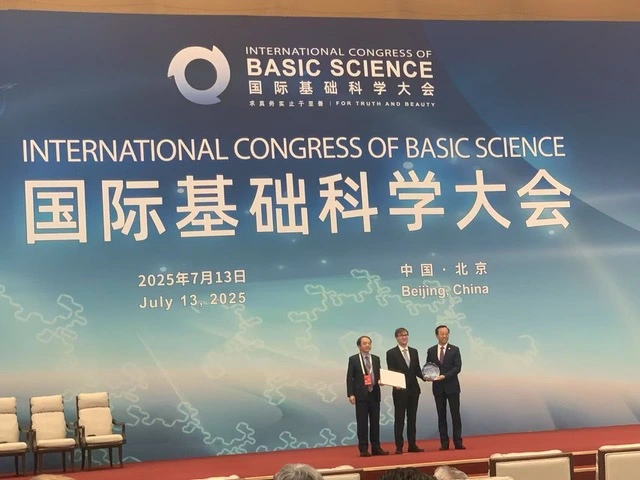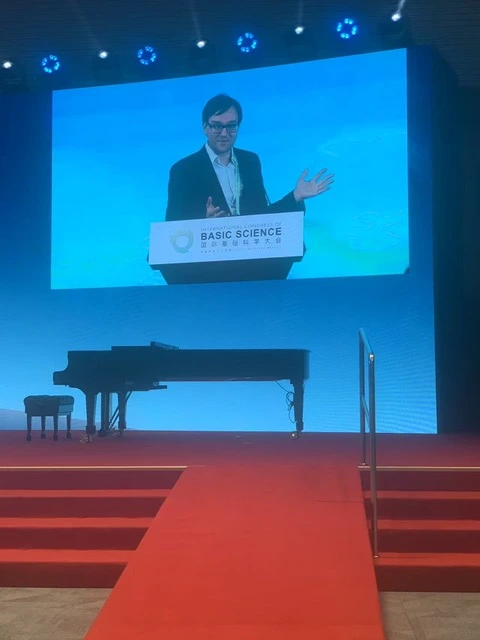Former UA Physics PhD student Felix Kling wins Frontiers of Science Award

Felix Kling, who received his PhD in Physics from the University of Arizona in 2016 and is currently a researcher in theoretical particle physics at UC Irvine and DESY, has been awarded the prestigious 2025 Frontiers of Science Award in Physics by the International Congress of Basic Sciences. The award recognizes the 2017 paper "ForwArd Search ExpeRiment at the LHC," co-authored with Jonathan Feng, Iftah Galon, and Sebastian Trojanowski.
The awarded work proposed the FASER experiment at the Large Hadron Collider (LHC), designed to search for light, feebly interacting particles. These particles are primarily produced in the very forward direction and can be long-lived, allowing them to travel hundreds of meters before decaying. To take advantage of both properties, Dr. Kling and his collaborators suggested placing a detector in an unused side tunnel located approximately 500 meters downstream of the ATLAS interaction point and hence at an ideal location to search for displaced decays of these elusive particles. Shortly afterward, Dr Kling and his colleagues also demonstrated that the same detector setup would be uniquely suited to study neutrino interactions at the LHC: an observation that had never been achieved before.
The idea quickly gained traction within the experimental community, leading to the formation of the FASER collaboration in 2018 and official approval by CERN in 2019. The project was made possible through the support of the Simons Foundation and the Heising-Simons Foundation. FASER began data collection in 2022 and has since conducted dedicated searches for dark photons and axion-like particles, producing world-leading constraints. In addition, it achieved the first-ever observation of neutrino interactions at the LHC, leading to measurements of their interaction rate in a previously uncharted energy range and marking the beginning of the emerging field of collider neutrino physics. Today, the FASER collaboration includes over 100 members from 27 institutions across 11 countries.
"My co-authors and I would like to thank the International Congress of Basic Science for this prestigious award." said Dr. Kling in his acceptance speech. "We also thank all our collaborators at the FASER experiment for their great work as well as our funding agencies, in particular the Simons Foundation and Heising-Simons Foundation, for their support." Dr. Kling now serves as the physics coordinator of FASER and looks forward to many exciting results to come. His former PhD advisor, Professor Shufang Su, wrote "It is unusual for a theorist to play a central role in an experimental proposal, and even more impressive given that Felix was just in his first postdoc at UC Irvine when he did the work."
Dr. Kling's main motivation in physics research is to gain a deeper understanding of the fundamental natural principles which rule our Universe at the smallest and largest scales. The area of physics that addresses this particular question is high energy physics. The current theory of nature is summarized in the Standard Model of particle physics and cosmology. While it accurately describes all currently discovered elementary particles and their corresponding interactions, it still leaves a variety of open questions. For example, we have observed dark matter via astronomical observations, but there is no such particle in the Standard Model. In addition, the universe is predominantly made of matter, which cannot be explained within the Standard Model. These puzzles provide evidence for the existence of physics beyond the Standard Model, which constitutes the central focus of his research. Dr. Kling specializes in the field of particle phenomenology, which connects the theoretical description of underlying physics to experiments and observations. He participates in the search for new physics by suggesting new search strategies and experiments, as well as by contributing tools and calculations to enhance the sensitivity of existing measurements.
Established in 2023, the Frontiers of Science Award is sponsored by the City of Beijing and the Yanqi Lake Beijing Institute of Mathematical Sciences and Applications (BIMSA). It honors groundbreaking contributions in mathematics, physics, and computer science. Each year, the prize is awarded to authors of recent research recognized for advancing fundamental understanding in their fields. Nominations are accepted worldwide and reviewed by an international committee of distinguished experts. The award ceremony took place on July 13th 2025 in Beijing, as part of the International Congress of Basic Sciences, with the participation of prominent figures from the international scientific community.





